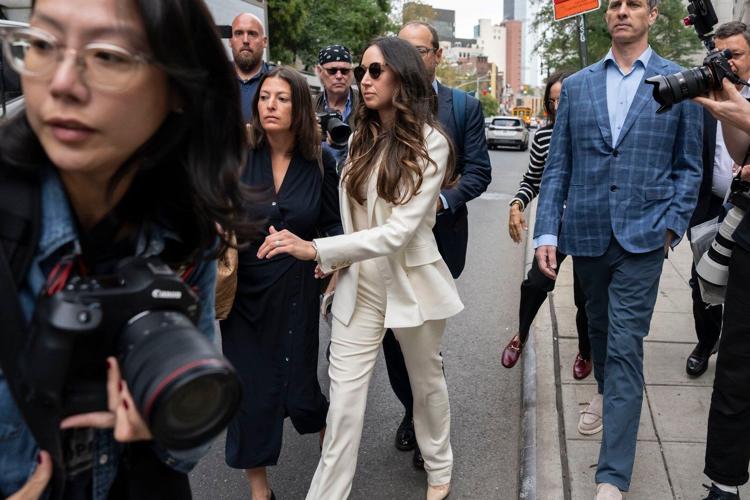Charlie Javice, founder of Frank startup, sentenced to 85 months in prison for defrauding JPMorgan Chase in a $175 million acquisition deal.
Charlie Javice, founder of the financial aid startup Frank and Forbes 30 under 30 alumnus, has been sentenced to seven years in prison for fraud.
The fintech startup had been acquired by JPMorgan Chase in 2021 for $175 million. The bank later accused Javice of lying about its customer base; the founder claimed the company had 4 million customers, when it actually had 300,000. Evidently, JPMorgan Chase did not do its due diligence before agreeing to buy Frank.

During the trial, former Frank engineer Patrick Vovor testified that Javice had asked him to create fake user data prior to the sale; when he declined, Javice asked math professor and data scientist Adam Kapelner for help creating synthetic data. Kapelner provided key testimony for the prosecution.
Along with her co-defendant, Frank’s chief growth officer Olivier Amar, Javice will be responsible for paying $278.5 million in restitution.
Who Is Charlie Javice ?
Charlie Javice is the founder of the fintech startup Frank, launched in 2017 to simplify the college financial aid process for students and parents. She was also featured in Forbes’ “30 Under 30” list for her early success in the tech and education space.
Her mission was clear: to make higher education more affordable. “College tuition is too damn high,” she wrote on LinkedIn in 2020, adding, “We founded Frank with a rebellious spirit and a big goal: Students should pay less for college.”
Charlie Javice fraud case
To fix this, Ms. Javice created “synthetic data” to add millions of fake customers with the help of Adam Kapelner, a math professor at Queens College, who said she would not tell him why she needed it. She and Olivier Amar, Frank’s chief growth officer, also bought real names and emails from commercial data brokers to make the customer list seem real because they knew the bank would test it.
Charlie Javice was sentenced to seven years in prison for defrauding JPMorgan Chase in the $175mn sale of her fintech start-up. https://t.co/54o2zDf220 pic.twitter.com/oMmfbuTIq1
— Financial Times (@FT) September 29, 2025
Ms. Javice wrote to the judge, “I accept the jury’s verdict and take full responsibility for my actions”, and during the hearing she tearfully apologized to JPMorgan shareholders, its in-house team, her parents, her boyfriend, and Frank employees, as stated by The New York Times.
JPMorgan frank acquisition scam
JPMorgan’s due diligence team did not detect the fraud during the acquisition, though the bank later figured out the scheme (source: report). Assistant U.S. Attorney Micah F. Fergenson said in court, “They acquired a crime scene”.
Ms. Javice’s lawyers, including Alexandra Shapiro, submitted 114 letters of support to ask the judge to be lenient. Supporters included four rabbis, a cantor, a formerly incarcerated judge, two doormen, and a marina worker near her Miami Beach home.
Some letters mentioned that Judge Hellerstein had spoken at a family funeral, and many highlighted Ms. Javice’s ongoing fertility treatments and worries that prison could affect her ability to have children, as per the report by The New York Times.
JPM acquisition
JPMorgan bought the startup, called Frank, to help the biggest U.S. bank by assets market its financial products to students. Frank was a digital platform that helped students apply for financial aid. In September 2021, JPMorgan told CNBC in an exclusive interview on the deal that the fintech firm had served more than five million students since Javice founded it.
But months after the deal closed, JPMorgan discovered that Frank had fewer than 300,000 real customers; the rest were synthetic identities created by Javice with the help of a data scientist.
Javice was arrested in 2023 on charges that she defrauded JPMorgan in the deal. Details that emerged later showed that Frank employees expressed disbelief when Javice directed them to boost their customer roster before the acquisition.
The week before selling her company to JPMorgan, Javice directed an employee to fabricate millions of users. When the employee declined, Javice reassured him, according to testimony given earlier this year.
“She said: ‘Don’t worry. I don’t want to end up in an orange jumpsuit,’” the employee testified.
Not Theranos
On Monday, Javice’s attorney Ronald Sullivan argued for a lighter sentence for his client, making the case that Frank helped customers. He contrasted the case against that of Elizabeth Holmes of Theranos infamy, whose fraud he said had “dangerous medical consequences,” and who was sentenced to 135 months in prison.
“Ms. Javice’s sentence should be nowhere near Elizabeth Holmes,’” Sullivan told Judge Hellerstein.
Assistant U.S. Attorney Micah Fergenson disagreed, arguing that Javice’s crime was fueled by greed.
“JPMorgan didn’t get a functioning business, they acquired a crime scene,” Fergenson said.
A courtroom sketch of Charlie Javice at her sentencing at court on Sept. 29, 2025 in New York City.
The episode was embarrassing for JPMorgan, which was thought to be one of the most sophisticated of corporate acquirers. Concerned about threats from fintech and big tech firms, the bank, led by CEO Jamie Dimon, went on a shopping spree of smaller fintech firms starting in 2020.
But JPMorgan, eager to edge out rivals bidding for the startup, failed to confirm that Frank actually had millions of customers before shelling out $175 million for the company.
Also read :
What will happen if there’s a government shutdown in U.S.
Dolly Parton Postpones Las Vegas Shows for December, Due to Health Issues
SpaceX to launch 28 Starlink satellites from California base